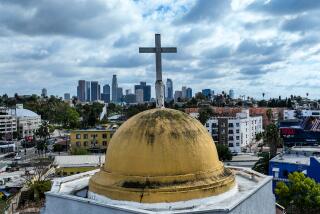The Word around the world
- Share via
Visit a large Korean church in Southern California and you are likely to see a distinctive part of the decor -- a world map peppered with markers locating missionaries supported by the church.
At Grace Korean Church in Fullerton, two walls inside the elegant atrium serve as a photo gallery highlighting the work of 208 missionaries serving in 47 countries, including Sweden, Italy, Argentina, Bangladesh, Russia and Vietnam.
“Mission is prayer. Mission is warfare. Mission is martyrdom,” reads a bilingual sign on a giant board that stands prominently on the 25-acre campus where a new Vision Center with a 3,000-seat auditorium is nearing completion.
The church, begun with three families 25 years ago in Los Angeles, today has 4,500 members and a $15-million annual budget. Half of the budget is set aside to support missions.
Along with rapid growth, 5 a.m. prayer worship and tithing, Korean churches on both sides of the Pacific are distinguished by their emphasis on evangelism. Surveys have shown that South Korea dispatches more Christian missionaries abroad than any other country except for the United States.
“Some passionate evangelicals even predict that it will not be long before South Korea is No. 1,” said Sun Gun Kim, a professor of sociology at Seowon University and an expert on Korean churches.
Christianity, in the form of Roman Catholicism, came to the Korean Peninsula centuries ago. But Christianity really took hold and spread after Protestant missionaries arrived in the late 19th century. The growth continued through Japan’s colonial rule (1910-1945), the Korean War and up to now.
South Korea is home to 23 of the 50 largest churches in the world, Kim said. Christians make up nearly 30% of the South Korean population -- 12 million Protestants and 5 million Roman Catholics.
The growth of Korean churches in the United States has also been rapid. An association of Korean Protestant churches in Southern California has 1,359 congregations representing 39 denominations. Many, following the style of most churches in Korea, are adorned with red crosses. Often lighted at night, they are a striking element of the Seoul skyline and a familiar sight in Korean neighborhoods in the L.A. area.
The first time the Rev. Douglas McConnell saw red neon crosses in Seoul’s nightscape, he was moved to tears.
“The church had such a significant impact on Korea that the most distinguishing feature of the Seoul skyline were the red crosses on top of the churches,” said McConnell, dean of the School of Intercultural Studies at Fuller Theological Seminary in Pasadena.
Missions are central to the Korean practice of Christianity. The Rev. John Huh, a former youth pastor at Irvine Baptist Church who led numerous mission trips, sees a fervor for evangelism among many young Korean Americans. “They may not want to get up for the early-morning prayer, but they love serving on short-term missions,” he said.
Tommy Dyo, national director of Epic Movement, an Asian American ministry of Campus Crusade for Christ, has seen the same trend. “I am so impressed with the Korean Christian movement,” Dyo said. “They are willing to step out in faith and take some big risks for the Lord.”
The reach -- and potential perils -- of Korean missionary work garnered international headlines last year, when Korean missionaries were abducted by Taliban insurgents in Afghanistan. Nineteen of the missionaries were released and two were killed.
Ho Chung, a former Garden Grove city councilman and a well-known Korean American community leader, tried to sum up the value of missionary work. Being a follower of Christ, he said, means taking up the cross every day. “Sanctification,” he said, “is a continuing journey -- of repentance and redemption.”
Many congregations place a premium on missionary work overseas, but some churches engage in missions closer to home. One such congregation, Maga Church near downtown Los Angeles, serves the down-and-out.
Dong Sun Chae, a UCLA physics major, started the church in 2001. Maga means Mark -- a reference to the Gospel of Mark. The church reaches out to Koreans who are hurting and needy, including refugees from China and North Korea.
Maga, not to be confused with a congregation by the same name in Koreatown, does not pass around offering plates or ask for donations from the 500 people who attend Sunday services. Instead, a donation box is stationed discreetly in the back of the sanctuary.
The church’s mission statement captures its brand of missionary work: “A church for the poor in spirit.”
More to Read
Sign up for Essential California
The most important California stories and recommendations in your inbox every morning.
You may occasionally receive promotional content from the Los Angeles Times.










